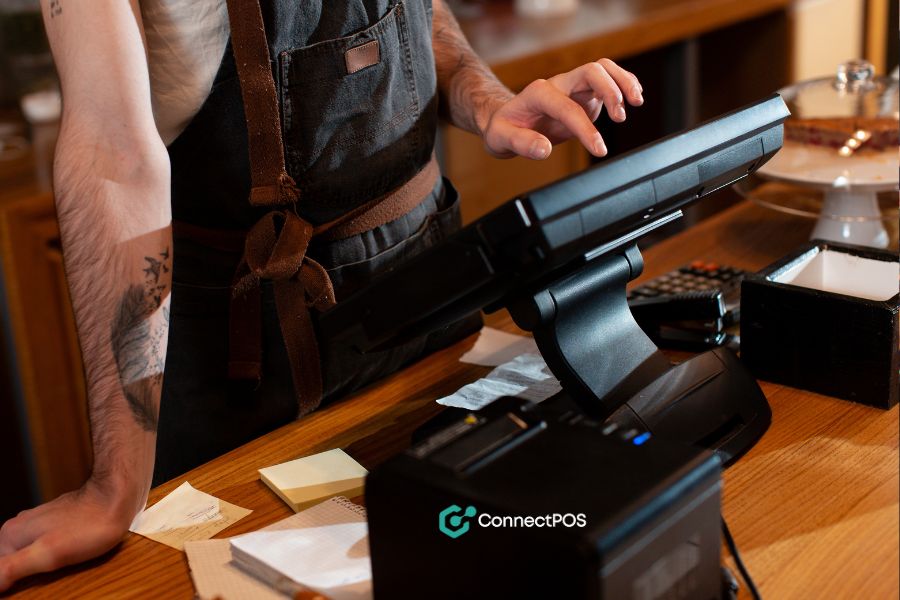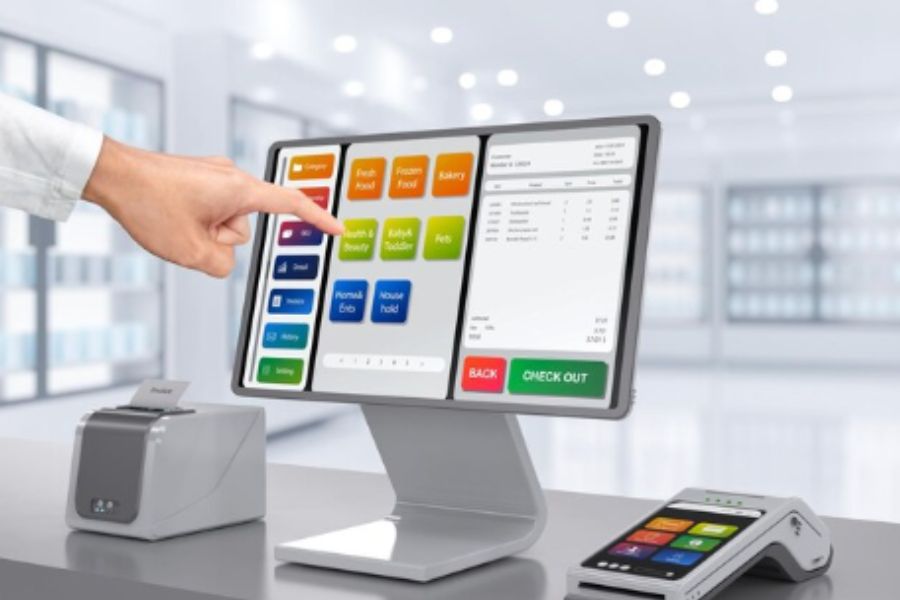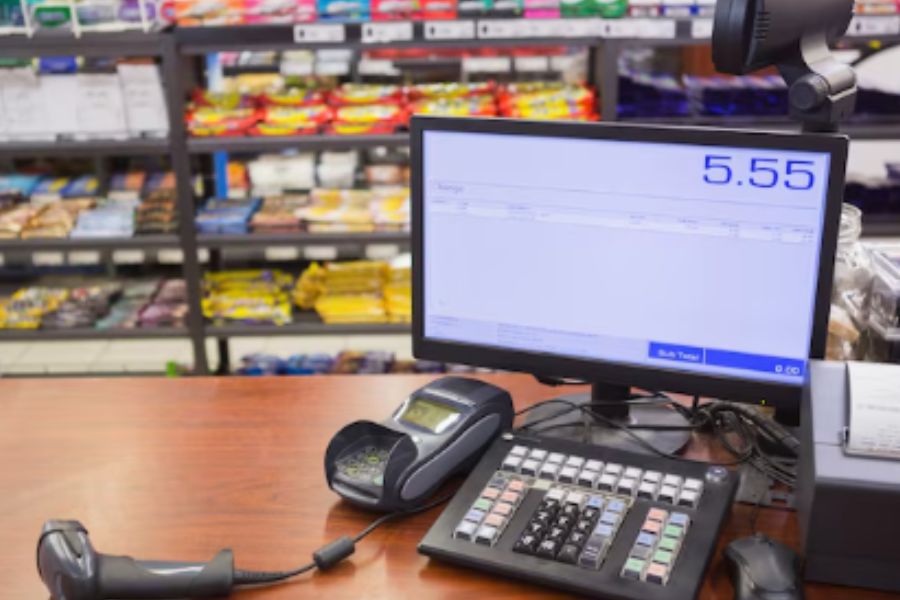As competition in manufacturing grows, businesses need tools that keep things moving without breaking the bank. One solution more and more manufacturers are turning to? Tablet POS manufacturer systems. These systems take the headache out of complex tasks, allow teams to stay mobile, and make operations more efficient from top to bottom.
If you’re thinking about integrating a tablet POS into your workflow, you’re in the right spot. We break down key strategies to help you roll out a system that boosts productivity and keeps your team moving.
Highlights:
- Manufacturing environments often involve fast-paced workflows, large facilities, and real-time coordination between production, inventory, and order management.
- When selecting a tablet POS for manufacturing, prioritize durability, offline access, integration with inventory systems, and support for barcode scanning to match the operational demands.
What is a Tablet POS System?
A tablet POS (point of sale) system is a modern sales and business management tool that runs on portable devices like iPads or Android tablets. It replaces bulky cash registers and fixed POS terminals, giving businesses the freedom to operate with more mobility and flexibility.
This setup typically includes a tablet, POS software, and optional add-ons like receipt printers, barcode scanners, and card readers. The software takes care of transactions, tracks inventory, and generates reports, making it a valuable asset for retail stores, restaurants, and service-based businesses.
One of its biggest perks is portability. Staff can move around, assist customers, and process payments on the spot, improving service efficiency. It’s also a budget-friendly alternative to traditional POS systems, with a user-friendly touchscreen that makes training a breeze.
That said, there are some trade-offs. Tablets are consumer-grade devices, so durability might be a concern in high-traffic environments. A stable internet connection is also crucial to prevent disruptions. Even with these factors in mind, a tablet POS remains a smart, cost-effective choice for businesses wanting a sleek, efficient, and modern sales solution.
Benefits of Tablet POS Systems in Manufacturing
Tablet POS manufacturer systems make daily operations smoother by keeping things flexible, cutting down on expenses, and making real-time data easily accessible. Let’s break down why manufacturers are making the switch.
Lower Costs, Higher Savings
Traditional POS setups come with hefty price tags, bulky hardware, ongoing maintenance, and clunky servers. Tablet-based systems? Not so much. They cost less upfront, require minimal maintenance, and if they’re cloud-based, they eliminate the need for expensive servers altogether. On top of that, going digital means less money spent on paper, ink, and other supplies. Fewer expenses, fewer headaches.
Work From Anywhere, Anytime
Manufacturing isn’t a desk job. Your team needs to move, whether they’re checking inventory in the warehouse, tracking production on the floor, or managing shipments. A tablet POS manufacturer lets employees handle transactions and update information right on the spot. No more running back and forth to a fixed workstation just to punch in data.
Get More Done in Less Time
Nobody likes bottlenecks on the factory floor. A tablet POS speeds things up by automating data entry, reducing errors, and keeping everything in sync. Workers won’t waste time double-checking paperwork or waiting on outdated records. Inventory levels, orders, and customer requests update in real time, keeping operations smooth and efficient. The result? Less downtime, fewer mistakes, and a production line that keeps moving.
Smarter Decisions with Better Data
Data is king in manufacturing, but digging through spreadsheets and paperwork? That’s yesterday’s problem. A tablet POS manufacturer collects, organizes, and analyzes data in real time. Need to check sales trends, track employee performance, or optimize inventory? It’s all right there, accessible with just a few taps. No more guessing, just clear, actionable insights that help you make better decisions, faster.
Key Recommendations for POS Implementation
Rolling out a tablet POS manufacturer system in a manufacturing setting isn’t just about installing new software and hoping for the best. To truly see the benefits, faster workflows, fewer errors, and a more connected operation, you need a solid plan. Every manufacturing environment has unique challenges, so a one-size-fits-all approach won’t cut it. Here’s how to ensure a smooth transition and get the most out of your investment.
Map Out Your Workflow
Before making any changes, take a hard look at how your operations run from start to finish. Where do things slow down? What’s causing mistakes? Which processes eat up the most time? Understanding these pain points helps pinpoint exactly where a tablet POS can make the biggest impact.
For instance, if inventory errors are stalling production, a tablet-based system that updates stock levels in real time could solve the issue. The goal here isn’t just to adopt new technology, it’s to fix what’s not working and make day-to-day tasks easier for your team.
Choose the Right Hardware
Manufacturing floors are tough environments, with dust, spills, high temperatures, and constant movement that can quickly wear down standard consumer tablets. That’s why choosing durable, industrial-grade hardware is a must.
Look for tablets with rugged casings, reinforced screens, and waterproof features. Battery life is another key factor; the last thing you want is a device shutting down mid-shift. Also, think about ergonomics, your team should be able to carry and use the tablets comfortably without fatigue.
Connect to Your Existing Systems
Your tablet POS manufacturer isn’t meant to operate in a vacuum. It should work alongside the tools you’re already using, like ERP, CRM, or inventory management software. The better these systems communicate, the less manual work your team has to do.
For example, integrating your tablet POS with your ERP can automatically update production schedules, material usage, and stock levels, reducing data entry errors and keeping everything in sync. Smooth integration means smoother operations.
Train Your Team for Success
Even the best system is useless if your team doesn’t know how to use it. Some employees might be hesitant to switch from manual processes, so hands-on training is key. Instead of just handing them a manual, show them real-world applications, how the system speeds up their tasks and makes their jobs easier.
Make training engaging and practical, focusing on time-saving features. Ongoing support is just as important; having resources available for questions after implementation ensures employees stay confident in using the system.
Customize for Your Needs
No two manufacturing plants operate the same way, so your POS system should adapt to fit your processes, not the other way around. A system that allows customization, from user permissions to workflow automation and reporting, will be far more effective than a generic setup.
For example, if different teams need access to specific data, setting up role-based permissions ensures they see only what’s relevant. Tailored dashboards and reporting tools also make it easier to track performance and identify areas for improvement.
Track Performance and Keep Optimizing
Just because the system is up and running doesn’t mean the job is done. Keep an eye on key performance indicators (KPIs) like inventory accuracy, processing speed, and overall efficiency. These metrics will show whether the system is meeting expectations or if adjustments are needed.
Regular reviews ensure your POS continues to support business growth. As operations evolve, make tweaks to improve workflows, update configurations, and take full advantage of new features.
A calculated implementation ensures that a tablet POS manufacturer doesn’t just add another layer of technology but actively improves your manufacturing process. By evaluating workflows, choosing the right hardware, ensuring seamless integration, training staff effectively, customizing features, and continuously optimizing, manufacturers can boost efficiency, increase mobility, and set their operations up for long-term success.
Overcoming Challenges Specific to Manufacturing
Manufacturing environments aren’t exactly gentle on technology. Between dust, fluctuating temperatures, and constant movement, a standard tablet won’t cut it. A successful tablet POS manufacturer rollout means thinking ahead and addressing potential roadblocks before they disrupt operations. Here’s how to overcome key challenges manufacturers face when adopting this technology.
Built to Last: Choosing the Right Hardware
Factories and warehouses can be challenging environments where dust, moisture, and extreme temperatures are part of everyday life. Accidental drops are inevitable, so durability should be your top priority.
When selecting devices, look for industrial-grade tablets that feature reinforced screens, shockproof casings, and waterproofing. These rugged devices are designed to withstand tough conditions, reducing downtime and lowering replacement costs. By investing in the right hardware from the beginning, you’ll minimize potential headaches in the future.
Staying Connected: Wi-Fi and Offline Functionality
Large facilities often struggle with spotty internet connections, and a POS system that relies entirely on Wi-Fi is bound to cause frustration. Without a stable connection, real-time updates can lag, leading to data inconsistencies and operational delays.
A strong Wi-Fi setup is essential, but backup options matter too. Choose a tablet POS manufacturer that supports offline functionality so that transactions and data entry continue even when the internet is down. Once connectivity is restored, the system should sync automatically to prevent data loss.
Keeping Data Secure
Manufacturers handle a lot of sensitive information, inventory records, pricing details, and customer data. A security breach could mean major financial losses and operational setbacks.
To keep everything locked down, opt for a tablet POS system with built-in security features like encryption, multi-factor authentication, and role-based access controls. Regular software updates and compliance with industry standards (such as PCI DSS for payment processing) also help prevent vulnerabilities.
ConnectPOS: The Next-Gen Tablet POS Solution for Manufacturers
Manufacturing isn’t just about production: it’s about efficiency, accuracy, and keeping everything running like clockwork. That’s where ConnectPOS comes in. This cloud-based tablet POS system is designed specifically for the fast-paced manufacturing world, combining mobility, real-time data, and seamless integration to simplify your operations. Whether you’re tracking inventory, processing transactions, or analyzing performance metrics, ConnectPOS keeps everything at your fingertips.
Why ConnectPOS stands out:
- Work From Anywhere: Move freely across the shop floor, warehouse, or office while handling transactions and updates in real time.
- Instant Insights: Get real-time reporting & analytics on sales, stock levels, and key performance indicators, helping you make smarter decisions on the go.
- Seamless Integration: Sync effortlessly with your existing ERP, CRM POS, and inventory management systems, eliminating manual data entry and reducing errors.
- Built-In Security: Protect your data with top-tier encryption, secure authentication, and compliance-ready features to keep your business safe.
- Customizable to Your Needs: Tailor the interface, workflows, and reporting tools to match your manufacturing processes, reducing downtime and boosting efficiency.
- Cost-Effective Scaling: Cloud-based technology keeps upfront costs low while growing with your business, making it a smart investment for the long haul.
- User-Friendly Design: Minimal training is required, and intuitive navigation ensures employees can hit the ground running with minimal disruption.
- Full Inventory Control: Track stock in real time, set automatic restock alerts, and prevent overstocking or shortages.
- Omnichannel Management: Whether selling in-store, online, or via mobile, ConnectPOS ensures all sales channels stay aligned.
- Multi-Location Sync: Standardize processes across different warehouses or branches, improving visibility and simplifying reporting.
With ConnectPOS, manufacturers get a powerful, flexible, and easy-to-use tablet POS solution that improves efficiency without the complexity. Whether you need better inventory tracking, real-time data access, or a more connected workflow, this system delivers. Upgrade your operations with a POS that’s built for today’s manufacturing challenges.
FAQs: Tablet POS Manufacturer
1. What are the primary benefits of integrating a tablet POS system in a manufacturing setting?
Integrating a tablet POS system in manufacturing delivers advantages like increased mobility, better inventory management, real-time data access, cost savings, and streamlined operations. These platforms allow employees to update and retrieve essential information instantly, significantly improving overall productivity.
2. What challenges might manufacturers face when implementing tablet POS systems, and how can they overcome them?
Manufacturers may face challenges including system compatibility, security vulnerabilities, and hardware durability in harsh environments. Overcoming these challenges involves performing thorough compatibility checks, adopting strong security measures, and selecting industrial-grade tablets built for tough operational settings.
3. How does staff training influence the successful adoption of tablet POS systems in manufacturing?
Proper staff training is essential for successful adoption. Comprehensive training ensures employees are confident using new technology, resulting in fewer errors and greater productivity. Investing in clear, practical training programs helps smooth the transition and maximizes the benefits of tablet POS software.
Final Thoughts
Manufacturers are always looking for ways to work smarter, lower expenses, and stay flexible. A tablet POS manufacturer system does just that by keeping operations simple. It allows staff to move freely, automates inventory tracking, and provides live data to guide decisions.
But adopting new tech isn’t enough. To get real value, you need the right setup. Choosing reliable hardware, syncing it with existing systems, and training staff properly are musts. Adjusting the system to fit daily workflows and tracking performance over time will make sure it runs smoothly.
A tablet POS like ConnectPOS takes it even further. With cloud-based technology, seamless integrations, and deep analytics, it gives manufacturers the tools to streamline operations and tackle industry challenges. Want to see how it fits your business? Get in touch today to see how it can support your business.



